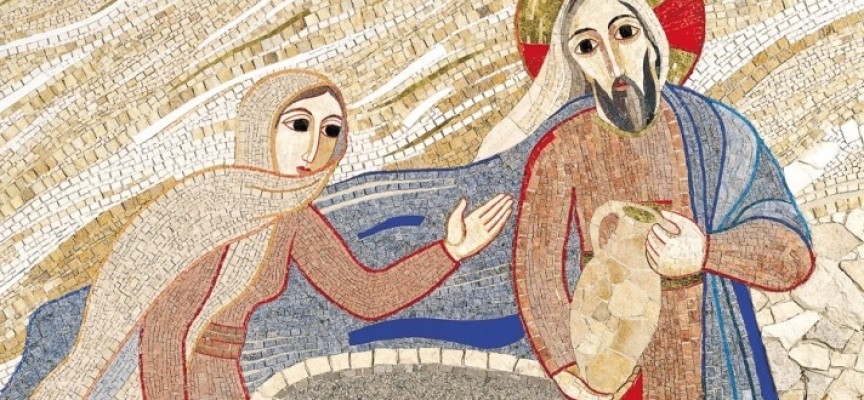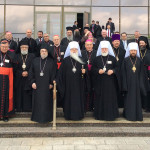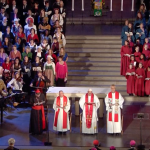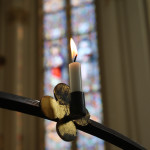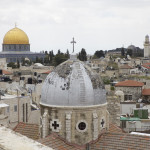While everybody is talking and has been talking about Brazil, with all its problems and contradictions, as the country hosting the 2014 FIFA World Cup, there’s another reason to talk about Brazil, which will “host” – and this is certainly much less known – the 2015 Week of Prayer for Christian Unity (January 18 to 25, 2015).
It was actually a work group coordinated by the Council of Churches of this South American country (Conic) who prepared the resources for next Week of Prayer entitled “Give me to drink”, taking as a starting point the passage in the Gospel where Jesus comes across a Samaritan woman (John 4:7). This encounter is the “icon of love that knocks down all separations due to religious, ethnic or cultural factors, as a paradigm of mercy that is able to also turn into a fervent disciple and missionary a woman who had had five husbands”, as Donatella Coalova wrote on an article on the July, 2 issue of “L’Osservatore Romano”.
“The image emerging from the words ‘give me to drink’ is an image speaking of complementarity: to drink water from someone else’s well is the first step towards experiencing another’s way of being. This leads to an exchange of gifts that enriches. Where the gifts of the other are refused much damage is done to society and to the Church”, write the Brazilian churches, appearing widely topical both in the ecumenical context, and also, if we turn our look to Europe, with relation to a growing “nationalistic” trend made of suspicion, of self-retreat and also, at times, of hatred towards the “other”.
“‘Give me to drink’ compels us to recognize that persons, communities, cultures, religions and ethnicities need each other”, the Brazilian Christians go on explaining and, with great frankness, tell that their country “is living through a time of growing intolerance made manifest in high levels of violence, especially against minorities and the vulnerable: black people, the young, homosexual people, women, indigenous people…”, with serious episodes also among the different Christian churches and towards other religions. And the condemnation is strong: “Although the 2010 official Census shows that 86.8% of the Brazilian population identify themselves as Christian, this country has very high rates of violence. Thus a high rate of Christian affiliation does not seem to translate into non-violent attitudes and respect for human dignity.”.
Although with certainly different percentages, both in terms of Christian affiliation and of violence, a parallelism might be made with Europe and its never enough mentioned “Christian roots” that, at times , seem to be unable to bring nourishment to a continent that, in terms of hospitality, social justice, defense of the weak and the different, environment protection, still has a long way to go. That’s why the Brazilian Christians call upon to a change and suggest the “Contextual Reading of the Bible”: to start from an actual situation and therefore from a “condemnation”, and then to look for the biblical text as “a flashlight to illuminate the path of our lives” and that “transforms us”.
Mentre il Brasile, con tutte le sue crisi e contraddizioni, ha fatto e sta facendo parlare di sé come Paese che ospita la coppa del mondo di calcio, c’è un altro motivo per cui parlare di Brasile, che “ospita” – e questo è certamente meno noto – la settimana di preghiera per l’unità dei cristiani 2015 (dal 18 al 25 gennaio).
È stato infatti un gruppo di lavoro coordinato dal Consiglio delle Chiese del Paese latinoamericano (Conic) a preparare il sussidio per la prossima settimana di preghiera “Dammi da bere” , prendendo spunto dal passo del Vangelo dove si racconta l’incontro tra Gesù e una donna, la samaritana (Gv, 4, 7). Questo incontro è “icona dell’amore che abbatte ogni separazione dovuta a fattori confessionali, etnici o culturali, come paradigma della misericordia capace di trasformare in ardente discepola e missionaria anche la donna che aveva avuto cinque mariti”, ha scritto Donatella Coalova in un articolo apparso sull’“Osservatore Romano” il 2 luglio.
“L’immagine che emerge dalle parole ‘dammi da bere’ è un’immagine che parla di complementarità: bere acqua dalla fonte di qualcun altro è il primo passo verso l’esperienza dell’altrui modo di essere. Questo porta a uno scambio di doni che arricchiscono. Quando i doni dell’altro sono rifiutati si fa molto danno alla società e alla Chiesa”, scrivono le chiese brasiliane, con un’attualità enorme sia nel contesto ecumenico, ma anche, se guardiamo all’Europa, per la crescente tendenza “nazionalistica” fatta di diffidenza, di ripiegamento e a volte anche di astio verso l’altro.
“‘Dammi da bere’ ci costringe a riconoscere che persone, comunità, culture, religioni ed etnie hanno bisogno l’una dell’altra”, spiegano ancora i cristiani del Brasile, che con grande trasparenza raccontano di come il loro Paese “stia vivendo un periodo di crescente intolleranza resa evidente da alti livelli di violenza, specialmente contro le minoranze e le persone vulnerabili: i neri, i giovani, gli omosessuali, le donne, gli indigeni…”, con gravi episodi anche tra le diverse confessioni cristiane e verso altre religioni. E la denuncia è forte: “Sebbene dal censimento ufficiale del 2010 emerga che l’86,8% della popolazione brasiliana si dichiari cristiana, questo paese ha tassi molto elevati di violenza. Un alto tasso di appartenenza cristiana non sembra tradursi in atteggiamenti di non violenza e di rispetto della dignità umana”.
Anche se con percentuali certamente diverse, sia in termini di affiliazione al cristianesimo sia di violenza, un parallelismo si potrebbe fare con l’Europa e le sue mai sufficientemente citate “radici cristiane”, che a volte sembra non riescano a portare la linfa a un continente che in termini di accoglienza, giustizia sociale, difesa dei deboli e del diverso, tutela dell’ambiente ha ancora della strada da fare. Per questo i cristiani del Brasile invitano al cambiamento e propongono la “lettura contestuale della Bibbia”: partire dalla situazione concreta e quindi dalla “denuncia”, per cercare nella Scrittura la “luce che illumina il cammino delle nostre vite” e che “ci trasforma”.

